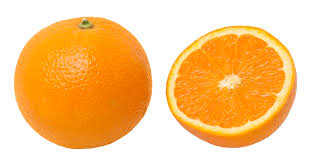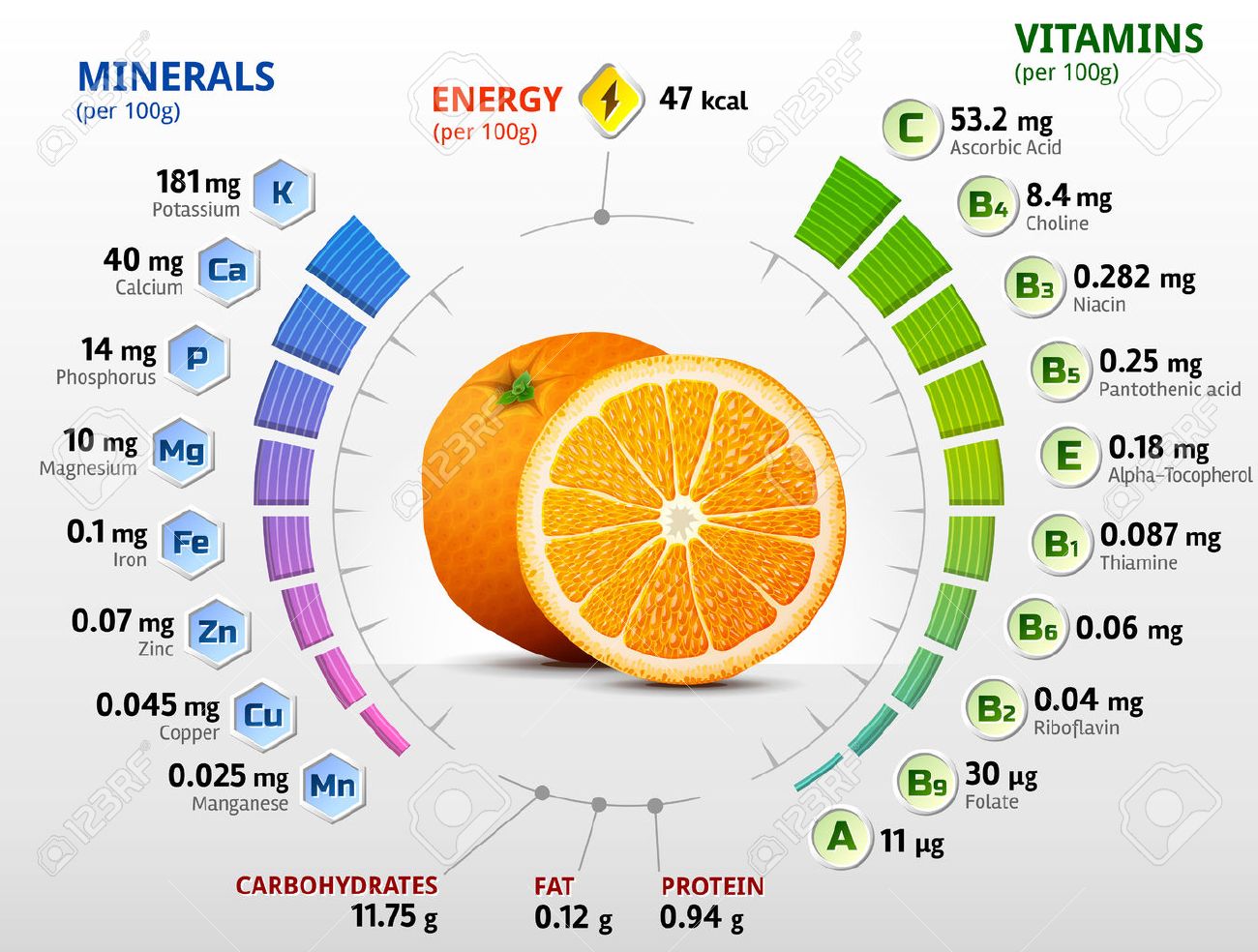orange



One medium-sized orange has:
- 60 calories.
- No fat or sodium.
- 3 grams of fiber.
- 12 grams of sugar.
- 1 gram of protein.
- 14 micrograms of vitamin A.
- 70 milligrams of vitamin C.
- 6% of daily recommended amount of calcium.
Oranges are mainly composed of carbs and water, with very little protein and fat and few calories.
Simple sugars — such as glucose, fructose, and sucrose — are the dominant form of carbs in oranges. They are responsible for the fruit’s sweet taste.
Despite their sugar content, oranges have a low glycemic index (GI) of 31–51 (1).
This is a measure of how quickly sugar enters your bloodstream after a meal.
Low GI values are associated with numerous health benefits (2Trusted Source).
Oranges’ low GI is explained by their high polyphenol and fiber content, which moderates the rise in blood sugar (3Trusted Source).
Fiber
Oranges are a good source of fiber. One large orange (184 grams) packs around 18% of the Reference Daily Intake (RDI) (4Trusted Source).
The main fibers found in oranges are pectin, cellulose, hemicellulose, and lignin.
Dietary fiber is associated with many beneficial health effects, including improved digestive health, weight loss, and cholesterol (5Trusted Source, 6Trusted Source, 7, 8).
SUMMARYOranges are primarily made up of carbs and water. They’re also a good source of fiber, which may support digestive health.
Oranges are a good source of several vitamins and minerals, especially vitamin C, thiamine, folate, and potassium.
- Vitamin C. Oranges are an excellent source of vitamin C. One large orange provides over 100% of the RDI (4Trusted Source).
- Thiamine. One of the B vitamins, also called vitamin B1, thiamine is found in a wide variety of foods.
- Folate. Also known as vitamin B9 or folic acid, folate has many essential functions and is found in many plant foods.
- Potassium. Oranges are a good source of potassium. High intake of potassium can lower blood pressure in people who already have high levels and may reduce your risk of heart disease (9Trusted Source).
SUMMARYA number of vitamins and minerals are found in oranges, including vitamin C, thiamine, folate, and potassium.
Other plant compounds
Oranges are rich in various bioactive plant compounds, which are believed to be responsible for many beneficial health effects.
The two main classes of antioxidant plant compounds in oranges are carotenoids and phenolics (phenolic compounds).
Phenolics
Oranges are an excellent source of phenolic compounds — especially flavonoids, which contribute to most of their antioxidant properties.
- Hesperidin. A citrus flavonoid that is one of the main antioxidants in oranges, hesperidin is associated with several health benefits (10, 11Trusted Source, 12).
- Anthocyanins. A class of antioxidant flavonoids, anthocyanins are responsible for the red flesh of blood oranges.
Carotenoids
All citrus fruits are high in carotenoids antioxidants, which are responsible for their rich color.
- Beta-cryptoxanthin. This is one of the most abundant carotenoid antioxidants in oranges. Your body converts it into vitamin A.
- Lycopene. An antioxidant found in high amounts in red-fleshed navel oranges (Cara cara oranges), lycopene is also found in tomatoes and grapefruit. It has various health benefits (13Trusted Source).
Citric acid
Oranges and other citrus fruits are high in citric acid and citrates, which contribute to their sour taste.
Research indicates that citric acid and citrates from oranges may help prevent kidney stone formation (14Trusted Source, 15Trusted Source).
SUMMARYOranges are a rich source of several plant compounds that are responsible for many of their health benefits.
Health benefits of oranges
Human and animal studies indicate that regular consumption of oranges is beneficial for health.
Heart health
Heart disease is currently the world's most common cause of premature death.
Flavonoids — especially hesperidin — in oranges may have protective effects against heart disease (11Trusted Source, 16).
Clinical studies in humans note that daily intake of orange juice for four weeks has a blood-thinning effect and may reduce blood pressure significantly (11Trusted Source, 17Trusted Source).
Fibers also seem to play a role. Intake of isolated fibers from citrus fruits has been shown to decrease blood cholesterol levels (8).
Taken together, it is likely that regular consumption of oranges may help lower your risk of heart disease.
Kidney stone prevention
Oranges are a good source of citric acid and citrates, which are believed to help prevent kidney stone formation.
Potassium citrate is often prescribed to patients with kidney stones. Citrates in oranges seem to have similar effects (14Trusted Source, 15Trusted Source).
Anemia prevention
Anemia is a condition characterized by low levels of red blood cells or hemoglobin, decreasing its ability to carry oxygen. It is often caused by iron deficiency.
Although oranges are not a good source of iron, they are an excellent source of organic acids, such as vitamin C (ascorbic acid) and citric acid.
Both vitamin C and citric acid can increase your body’s absorption of iron from the digestive tract (18Trusted Source, 19Trusted Source).
When eaten with iron-rich food, oranges may help prevent anemia.
SUMMARYOranges may benefit heart health and help prevent kidney stones. While not rich in iron, they may also protect against anemia by increasing your iron absorption.
Whole oranges vs. orange juice
Orange juice is a popular drink throughout the world.
One of the main differences between pure orange juice and whole oranges is that juice is much lower in fiber (4Trusted Source).
One cup (240 ml) of pure orange juice has a similar amount of natural sugar as 2 whole oranges and is much less filling (4Trusted Source).
As a result, fruit juice consumption can often become excessive and may contribute to weight gain and health problems (20Trusted Source, 21Trusted Source, 22Trusted Source).
This applies especially to juice that contains added sugar.
Although quality orange juice can be healthy in moderation, whole oranges are generally a much better choice.
SUMMARYEating whole oranges is healthier than drinking orange juice. Fruit juices tend to be high in sugar and not as filling as whole fruit.
Oranges don't have many known adverse effects.
Some people have an orange allergy, but this is rare.
For people who experience heartburn, consumption of oranges can make symptoms worse. This is because oranges contain organic acids, mainly citric acid and ascorbic acid (vitamin C).
SUMMARYSome people are allergic to oranges, and their acidity may increase the symptoms of heartburn. However, oranges pose few health risks overall.
The bottom line
Oranges are among the world's most popular fruits, as they’re both tasty and nutritious.
They are a good source of vitamin C, as well as several other vitamins, minerals, and antioxidants.
For this reason, they may lower your risk of heart disease and kidney stones.
Put simply, this bright citrus fruit is an excellent addition to a healthy diet.
This is because the human body either does not produce enough of them, or it does not produce any at all.
Each organism has different vitamin requirements. For example, humans need to consume vitamin C, or ascorbic acid, but dogs do not. Dogs can produce, or synthesize, enough vitamin C for their own needs, but humans cannot.
Cranberry Orange Smoothie
Ingredients
- 1 banana
- ½ cup mixed berries fresh or frozen
- ¼ cup cranberry sauce
- ¼ cup oats (old fashioned, baby cereal or quick-cooking all work)
- ¼ cup orange juice
- 4 oz Stonyfield yogurt – any flavor
- 4-5 ice cubes optional
Instructions
Place all ingredients in a high speed blender and puree until smooth.
Serve in a sippy cup with attached straw for baby-friendly feeding.
Nutrition Information:
Calories: 213kcal | Carbohydrates: 45g | Protein: 5g | Fat: 2g | Saturated Fat: 0g | Cholesterol: 3mg | Sodium: 53mg | Potassium: 463mg | Fiber: 3g | Sugar: 30g | Vitamin A: 2.6% | Vitamin C: 27.6% | Calcium: 10.9% | Iron: 3.2%

Ingredients
- 1 large orange seedless, peeled
- 1 cup shredded carrots
- 2 tablespoons Bob's Red Mill Flax Seeds or flax seed meal
- 3 inch piece ginger thinly sliced
- 2/3 cup Bob's Red Mill protein powder any flavor
- 1/4 cup lemon juice
- 1/2 cup water
- ice to taste
Instructions
Place all ingredients in a high speed blender and puree until smooth. Add more ice to thicken until you've reached desired consistency.
